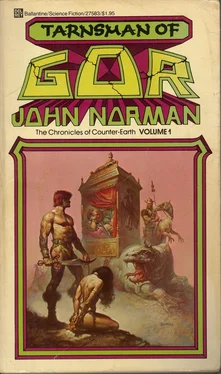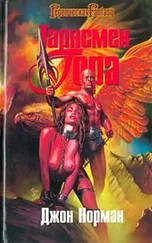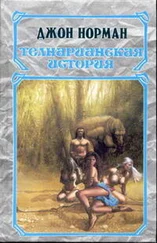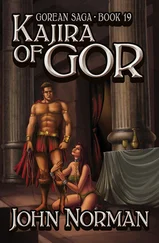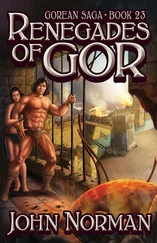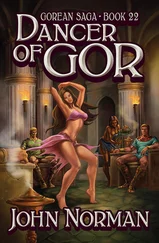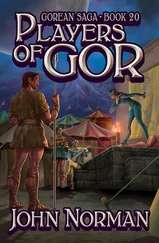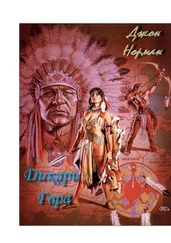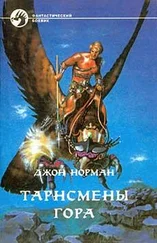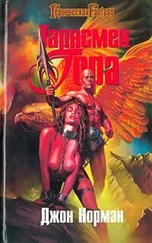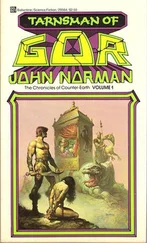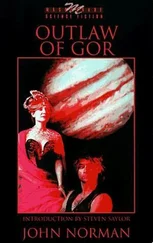The Cylinder of Justice was a lofty cylinder of pure white marble, the flat roof of which was some hundred yards in diameter. There were about two hundred people on the cylinder roof. I could see the white robes of Initiates and the variegated colors of soldiers, both of Ar and of Pa-Kur's horde. And, dark among these shapes, like shadows, I could see the somber black of members of the Caste of Assassins. The high impaling post, normally visible on the top of the cylinder, had been lowered. When it was raised again, it would bear the body of Talena.
I was over the cylinder and dropping the taro — to its center. With cries of surprise and rage, men scattered from beneath the suddenly descending gigantic shape. I had expected to be fired on immediately but suddenly remembered that I still wore the garb of the messenger. No Assassin would fire on me, and no one else would dare.
The tarn's steel-shod talons struck the marble roof of the cylinder with a flash of sparks. The great wings smote the air twice, raising a small hurricane that caused the startled onlookers to stagger backward. Lying on the ground, bound hand and foot, still clad in the white robe, was Talena. The point of the sharpened impaling post lay near her. As the tarn had landed, her executioners, two burly, hooded magistrates, had scrambled to their feet and fled to safety. The Initiates themselves do not execute their victims, as the shedding of blood is forbidden by those beliefs they regard as sacred. Now, helpless, Talena lay almost within the wing span of my tarn, so near to me and yet a world away.
"What is the meaning of this!" cried a strident voice, that of Pa-Kur.
I turned to face him, and the fury of what he meant to me ripped through my body, surging like a volcano, almost dominating me. Yet I did not answer him. Instead I called out to the men of Ar on the cylinder. "Men of Ar," I cried, "behold!" I gestured widely to the fields beyond the great gate. The approaching swarm of Pa-Kur's horde was visible, and the dust rose a thousand feet into the air. There were cries of rage.
"Who are you?" cried Pa-Kur, drawing his sword.
I threw off my helmet, flinging it down. "I am Tarl of Bristol," I said.
The cry of amazement and joy that broke from Talena's lips told me all I wanted to know.
"Impale,her," shouted Pa-Kur.
As the burly magistrates hastened forward, I seized my spear and hurled it with such force as I would not have believed possible. The spear flashed through the air like a bolt of lightning and struck the oncoming magistrate in the chest, passing through his body and burying itself in the heart of his companion.
There was an awe-stricken silence as the immensity of what had occurred impressed itself on the onlookers.
I was conscious of distant shouting in the streets far below. There was a smell of smoke. There was the faint clash of arms. "Men of Ar," I cried, "listen! Even now, in the streets below, Marlenus, your Ubar, fights for the freedom of Ar!"
The men of Ar looked at one another.
"Will you surrender your city? Yield your lives and women to Assassins?" I challenged. "Are you truly the men of never-conquered, imperishable Ar? Or are you but slaves who will exchange your freedom for the collar of Pa-Kur?"
"Down with the Initiates!" cried one man, drawing his sword. "Down with the Assassin!" cried another. There were shouts from the men of Ar and cries of terror from the Initiates as they cringed or fled. Almost as if by magic, the men of Ar had separated themselves from the others on the cylinder. Swords were drawn. In an instant they would join the battle raging in the streets.
"Stop!"
A great, solemn, hollow voice boomed. All eyes on the roof turned to the sound of that voice. The Supreme Initiate of Ar himself stood forth, separating himself disdainfully from the cowering knot of white robed figures that cringed behind him. He strode majestically across the roof. Both the men of Ar and those of Pa-Kur fell back. The Supreme Initiate was an emaciated, incredibly tall man, with smooth-shaven, bluish, sunken cheeks and wild, prophetic eyes. He was ascetic, fervent, sinister, fanatic. One long, claw like hand was raised grandly to the heavens. "Who will challenge the will of the Priest-Kings?" he demanded.
No one spoke. The men, of both sides, fell back even farther. Pa-Kur himself seemed awed. The spiritual power of the Supreme Initiate was almost sensible in the air. The religious conditioning of the men of Gor, based on superstition though it might be, was as powerful as a set of chains — more powerful than chains because they did not realize it existed. They feared the word, the curse, of this old man without weapons more than they would have feared the massed swords of a thousand foemen.
"If it is the will of the Priest-Kings," I said, "to bring about the death of an innocent girl, then I challenge their will."
Such words had never before been spoken on Gor.
Except for the wind, there was no sound on the great cylinder.
The Supreme Initiate turned and faced me, pointing that long skeletal finger.
"Die the Flame Death," he said.
I had heard of the Flame Death from my father and from the Older Tarl — that legendary fate which overtook those who had transgressed the will of the Priest-Kings. I knew almost nothing of the fabled Priest-Kings, but I did know that something of the sort must exist, for I had j been brought to Gor by an advanced technology, and I knew that some force or power lay in the mysterious, Sardar Mountains. I did not believe that the Priest-Kings were divine, but I did believe that they lived and that they were aware of what occurred on Gor and that from time to time they made known their will. I did not even know if they were human or nonhuman, but, whatever they might be, they were, with their advanced science and technology, for all practical purposes, the gods of this world.
On the back of my tarn, I waited, not knowing if I was to be singled out for the Flame Death, not knowing if I, like the mysterious blue envelope in the mountains of New Hampshire, so long ago, was doomed to explode in a devouring blue flame.
"Die the Flame Death," repeated the old man, once again jabbing that long finger in my direction. But this time the gesture was less grand; it seemed a bit hysterical; it seemed pathetic.
"Perhaps no man knows the will of the Priest-Kings," I said.
"I have decreed the death of the girl," cried the old man wildly, his robes fluttering around his bony knees. "Kill her!" he shouted to the men of Ar.
No one moved. Then, before anyone could stop him, he seized a sword from the scabbard of an Assassin and rushed to Talena, holding it over his head with both hands. He wobbled hysterically, his eyes mad, his mouth slobbering, his faith in the Priest-Kings shattered, and with it his mind. He wavered over the girl, ready to kill.
"No!" cried one of the Initiates. "It is forbidden!"
Heedlessly, the insane old man tensed for the blow that would end the life of the girl. But in that instant he seemed to be concealed in a bluish haze, and then, suddenly, to the horror of all, he seemed, like a living bomb, to explode with fire. Not even a scream came from that fierce blue combustive mass that had been a human being, and in a minute the flame had departed, almost as quickly as it had come, and a dust of ashes scattered from the top of the cylinder in the wind.
The voice of Pa-Kur was heard, level and unnaturally calm. "The sword shall decide these matters," he said.
Accordingly, I slid from the saddle of the tarn, unsheathing my weapon.
Pa-Kur was said to be the finest swordsman on Gor.
From far below, the distant shouts of fighting in the streets drifted upward. The Initiates had vanished from the roof of the cylinder.
One of the men of Ar said, "I choose for Marlenus." "And I," said another.
Читать дальше
